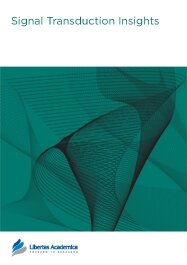


Is this journal right for my paper?
Ask Editor in ChiefEditor in Chief: Edgar Grinstein
Aims & Scope: Signal Transduction Insights is an open access, peer-reviewed online journal that covers all aspect... more
Indexing & Databases: Chemical Abstracts Service, Chinese Electronic Periodical Service, EBSCO Academic Search Complete, Gale Academic OneFile, Gale Health Reference Centre, Gale InfoTrac Custom Journals, Illustrata-Technology, Index Copernicus, OAlster, ProQuest SciTech, ProQuest Technology, Socolar
Journal Directories: Academic Journals Database, EBSCO A-Z, HINARI, JournalSeek, JournalTOCs, OAJSE, Scirus, Ulrich's Periodicals
Processing Speed: Editorial decision less than 3 weeks, publication in average 3 weeks after acceptance
ISSN: 1178-6434
Signup for Email Alerts and keep in touch with Signal Transduction Insights journal news, updates, events and articles
I found that publishing my paper in Signal Transduction Insights was a very satisfying experience. The submission process was simple, review rapid and thorough and the appearance of the article was first rate. I recommend this journal.

All authors are surveyed after their articles are published. Authors are asked to rate their experience in a variety of areas, and their responses help us to monitor our performance. Presented here are their responses in some key areas. No 'poor' or 'very poor' responses were received; these are represented in the 'other' category.See Our Results
Copyright © 2014 Libertas Academica Ltd (except open access articles and accompanying metadata and supplementary files.)
Facebook Google+ Twitter
Pinterest Tumblr YouTube